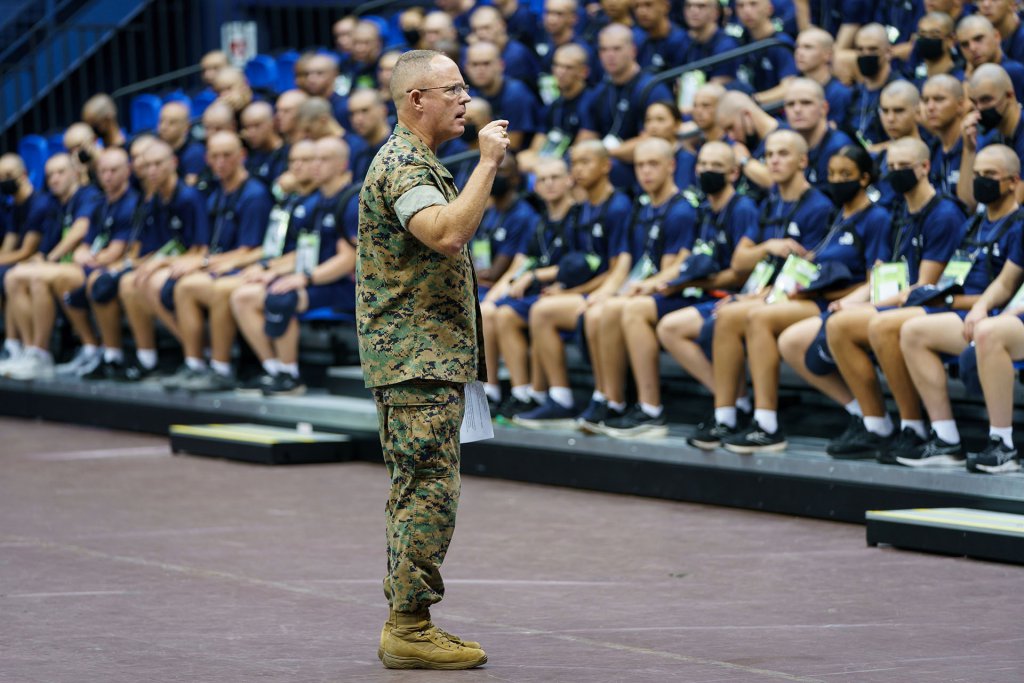“I don’t want to say I dreamed of being commandant, but boy, does it feel like a dream. I am both humbled and honored to be here,” said retired U.S. Marine Corps Col. Thomas Gordon, ’91, about two months after returning to his alma mater, where he now serves as commandant of cadets.
A native of Boston, Mass., Gordon served in the Marine Corps for 30 years before his retirement in July. In his last assignment, he served as director of the Marine Corps’ Command and Staff College, a position that made him a natural fit to succeed retired U.S. Navy Capt. Eugene Paluso, ’89, as commandant. A lifelong student of leader development, Gordon began his study of leadership as a cadet, journaling in a green clothbound DOD-issued notebook, jotting down what he considered good leadership and what he considered bad.
“Whenever I worked for or was in proximity of somebody who I thought was a great leader, I would pause and write down what I admired so that if I were ever in command, I could do that,” said Gordon. “Conversely, when I encountered a toxic or poor leader, I would flip to the back of the book and affirm things I would never do. After about 20 years, the front of the book met the back of the book. I was fortunate to have more entries in the front than in the back, but in reflection I probably learned more from the entries in the back.”
Over the years, Gordon began to notice a shift in the leadership entries he was recording. “As colonel,” said Gordon, “I found myself journaling about the attributes of my subordinate commanders.” Instead of recording if-I-were-ever-in-command entries, he found himself making I-wish-I-had-done-that entries, with the goal of passing them on to the next generation.
The green notebook has become fodder for an upcoming book, Marine Maxims: 50 Lessons on Turning Principles into Practice, which will be published in November by the Naval Institute Press.

Much like his leadership journaling, Gordon has begun his leadership as commandant with a listening tour. “For the next few months, I’m going to be doing a lot of active listening so I can get a feel for things,” he said. “I think it would be a huge mistake for me to think that I know what’s going on around here simply because I was a cadet 30 years ago.”
As he conducts his listening tour, Gordon is hopeful about the future. He sees the potential for the college to emerge from the pandemic with newfound fortitude. “We’re going to work through the global pandemic. This will be a rebuilding year. We will bring the Corps back better than ever. We will do it safely. We will do it responsibly. We build in resiliency and, in turn, we will accomplish the mission.”
In the process, Gordon hopes to better integrate character development and challenge cadets to reframe adversity as “an obstacle to overcome, not something to be afraid of or to avoid,” a lesson he learned as a cadet and the reason he believes graduates are successful. “We produce men and women of virtue and character, who have a higher degree of resiliency. They have grit, they have fortitude, they have will,” he said. “My personal definition of leadership is the ability to inspire others to find the will and the way to accomplish the mission.”
To do that, he follows the Socratic method of teaching. “If I tell people what to do, they will do just that,” he said, “but if instead I present it to them as a question, nine times out of 10, they’re going to have a better way of doing it than I ever thought of.”
With his characteristic humility and his artful questions, Gordon will surely inspire and uncover new lessons in leadership in the Corps of Cadets. “We all want the same thing; we want what’s best for The Citadel and what’s best for the cadets.”
